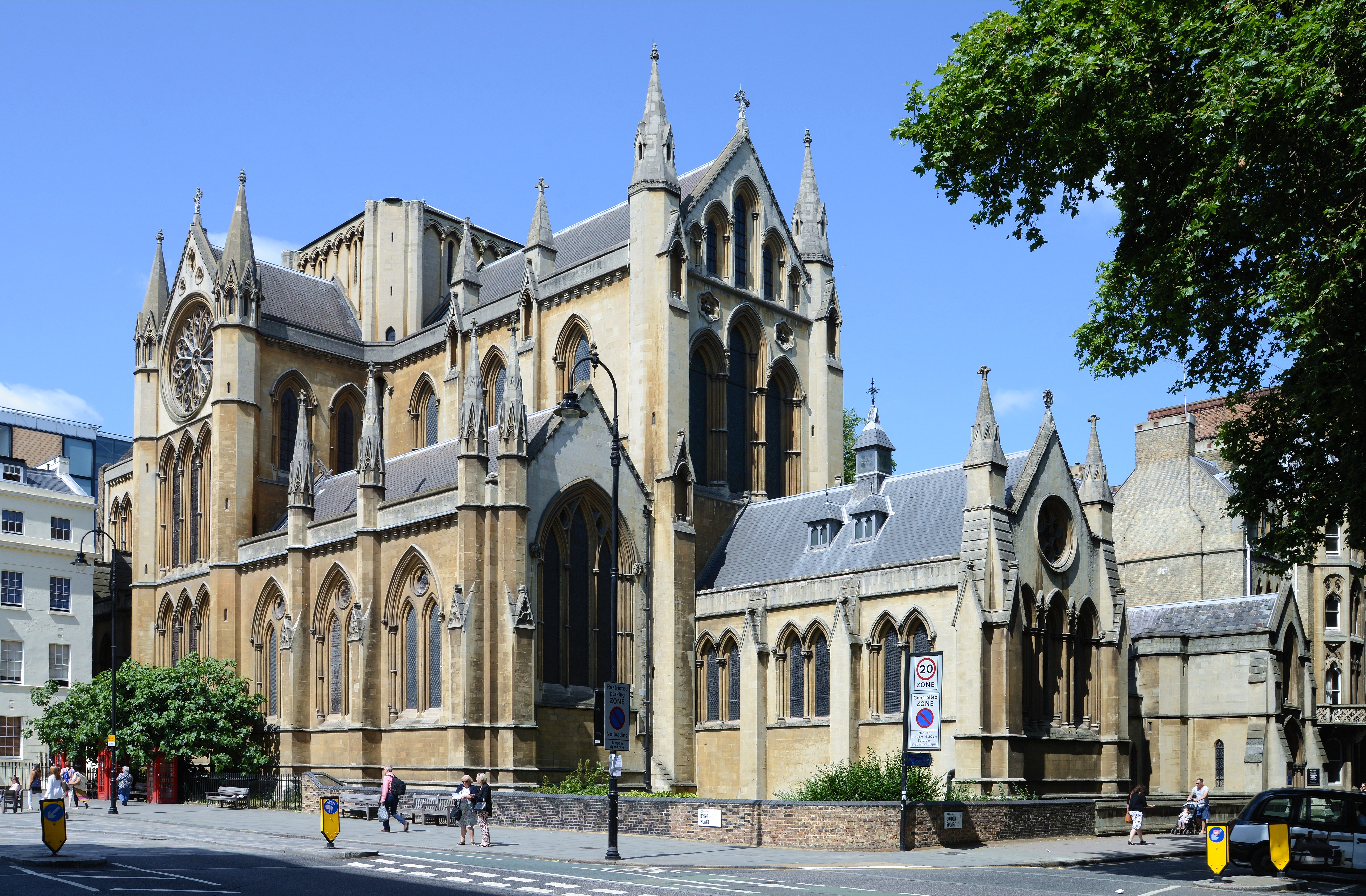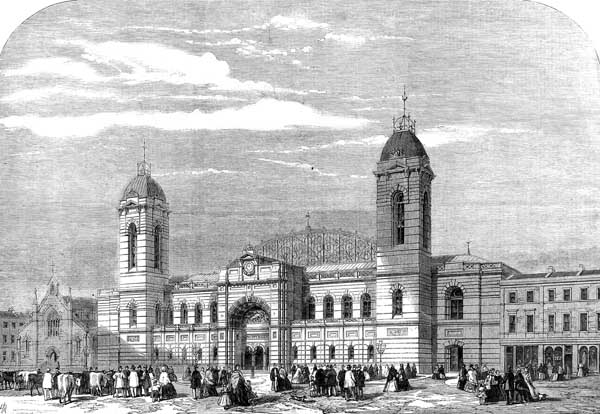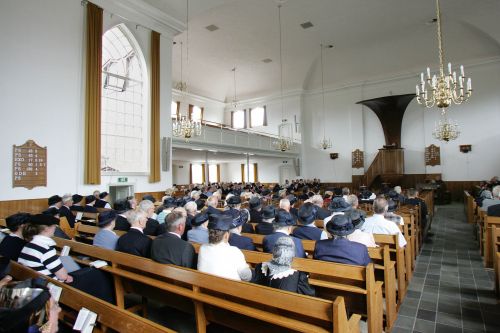|
Irvingian
The Catholic Apostolic Church (CAC), also known as the Irvingian Church or Irvingite Church, is a denomination in the Restorationist branch of Christianity. It originated in Scotland around 1831 and later spread to Germany and the United States. The tradition to which the Catholic Apostolic Church belongs is sometimes referred to as Irvingism or the Irvingian movement after Edward Irving (1792–1834), a clergyman of the Church of Scotland credited with organising the movement. The church was organised in 1835 with the fourfold ministry of "apostles, prophets, evangelists, and pastors". The denominations in the tradition of the Catholic Apostolic Church teach "the restoration to the universal church of prophetic gifts by the direct inspiration of the Holy Ghost." As a result of schism within the Catholic Apostolic Church, other Irvingian Christian denominations emerged, including the Old Apostolic Church, New Apostolic Church, Reformed Old Apostolic Church and United Aposto ... [...More Info...] [...Related Items...] OR: [Wikipedia] [Google] [Baidu] |
Restorationist
Restorationism, also known as Christian primitivism, is a religious perspective according to which the early beliefs and practices of the followers of Jesus were either lost or adulterated after his death and required a "restoration". It is a view that often "seeks to correct faults or deficiencies, in other branches of Christianity, by appealing to the primitive church as normative model". Efforts to restore an earlier, purer form of Christianity are frequently a response to denominationalism. As Rubel Shelly put it, "the motive behind all restoration movements is to tear down the walls of separation by a return to the practice of the original, essential and universal features of the Christian religion." Different groups have tried to implement the restorationist vision in a variety of ways; for instance, some have focused on the structure and practice of the church, others on the ethical life of the church, and others on the direct experience of the Holy Spirit in the lif ... [...More Info...] [...Related Items...] OR: [Wikipedia] [Google] [Baidu] |
Holy Communion
The Eucharist ( ; from , ), also called Holy Communion, the Blessed Sacrament or the Lord's Supper, is a Christian rite, considered a sacrament in most churches and an ordinance in others. Christians believe that the rite was instituted by Jesus at the Last Supper, the night before his crucifixion, giving his disciples bread and wine. Passages in the New Testament state that he commanded them to "do this in memory of me" while referring to the bread as "my body" and the cup of wine as "the blood of my covenant, which is poured out for many". According to the synoptic Gospels, this was at a Passover meal. The elements of the Eucharist, sacramental bread, either leavened or unleavened, and sacramental wine (non-alcoholic grape juice in some Protestant traditions, such as Methodism), are consecrated on an altar or a communion table and consumed thereafter. The consecrated elements are the end product of the Eucharistic Prayer. Christians generally recognize a special presen ... [...More Info...] [...Related Items...] OR: [Wikipedia] [Google] [Baidu] |
New Apostolic Church
The New Apostolic Church (NAC) is a Christian denomination, Christian church of the Catholic Apostolic Church, Irvingian tradition. Its origins are in 1863, in the split from the Catholic Apostolic Church during a schism in Hamburg, Germany. The church has existed since 1863 in Germany and since 1897 in the Netherlands. It came about from the Schism (religion), schism in Hamburg in 1863, when it separated from the Catholic Apostolic Church, which itself started in the 1830s as a renewal movement in, among others, the Anglican Church and Church of Scotland. The Second Coming of Christ is at the forefront of the New Apostolic doctrines. Most of its doctrines are akin to mainstream Christianity and, especially its liturgy, to Protestantism, whereas its hierarchy and organisation could be compared with the Roman Catholic, Roman Catholic Church. It is a central church in the Irvingism, Irvingian orientation of Christianity. The church considers itself to be the re-establish ... [...More Info...] [...Related Items...] OR: [Wikipedia] [Google] [Baidu] |
Christian Denomination
A Christian denomination is a distinct Religion, religious body within Christianity that comprises all Church (congregation), church congregations of the same kind, identifiable by traits such as a name, particular history, organization, leadership, theology, theological doctrine, worship style and, sometimes, a founder. It is a secular and neutral term, generally used to denote any established Christian church. Unlike a cult or sect, a denomination is usually seen as part of the Christian religious mainstream. Most Christian denominations refer to themselves as ''churches'', whereas some newer ones tend to interchangeably use the terms ''churches'', ''assemblies'', Koinonia, ''fellowships'', etc. Divisions between one group and another are defined by authority and doctrine; issues such as the Christology, nature of Jesus, the authority of apostolic succession, biblical hermeneutics, Christian theology, theology, ecclesiology, Christian eschatology, eschatology, and papal primacy m ... [...More Info...] [...Related Items...] OR: [Wikipedia] [Google] [Baidu] |
Sacraments
A sacrament is a Christian rite which is recognized as being particularly important and significant. There are various views on the existence, number and meaning of such rites. Many Christians consider the sacraments to be a visible symbol of the reality of God, as well as a channel for God's grace. Many denominations, including the Catholic, Lutheran, Presbyterian, Anglican, Baptist, Methodist, and Reformed, hold to the definition of sacrament formulated by Augustine of Hippo: an outward sign of an inward grace, that has been instituted by Jesus Christ. Sacraments signify God's grace in a way that is outwardly observable to the participant. The Catholic Church, Hussite Church and the Old Catholic Church recognize seven sacraments: Baptism, Penance (Reconciliation or Confession), Eucharist (or Holy Communion), Confirmation, Marriage (Matrimony), Holy Orders, and Anointing of the Sick (Extreme Unction). The Eastern Churches, such as the Eastern Orthodox Church and Orien ... [...More Info...] [...Related Items...] OR: [Wikipedia] [Google] [Baidu] |
Baptism With The Holy Spirit
In Christian theology, baptism with the Holy Spirit, also called baptism in the Holy Spirit or baptism in the Holy Ghost, has been interpreted by different Christian denominations and traditions in a variety of ways due to differences in the doctrines of salvation and ecclesiology. It is frequently associated with incorporation into the Christian Church, the bestowal of spiritual gifts, and empowerment for Christian ministry. Spirit baptism has been variously defined as part of the sacraments of initiation into the church, as being synonymous with regeneration, or as being synonymous with Christian perfection. The term ''baptism with the Holy Spirit'' originates in the New Testament, and all Christian traditions accept it as a theological concept. Prior to the 18th century, most denominations believed that Christians received the baptism with the Holy Spirit either upon conversion and regeneration or through rites of Christian initiation, such as water baptism and confirmation ... [...More Info...] [...Related Items...] OR: [Wikipedia] [Google] [Baidu] |
Elder (Christianity)
In Christianity, an elder is a person who is valued for wisdom and holds a position of responsibility and authority in a Christian group. In some Christian traditions (e.g., Eastern Orthodoxy, Roman Catholicism, Anglicanism, Methodism) an ''elder'' is an ordained person who serves a local church or churches and who has been ordained to a ministry of word, sacrament and order, filling the preaching and pastoral offices. In other Christian traditions (e.g., Presbyterianism, Churches of Christ, Plymouth Brethren), an elder may be a lay person serving as an administrator in a local congregation, or be ordained and serving in preaching (teaching during church gatherings) or pastoral roles. There is a distinction between ordained elders and lay elders. The two concepts may be conflated in everyday conversation (for example, a lay elder in the Baptist tradition may be referred to as "clergy", especially in America). In non-Christian world cultures the term elder refers to age and exper ... [...More Info...] [...Related Items...] OR: [Wikipedia] [Google] [Baidu] |
Barnsbury
Barnsbury is an area of north London in the London Borough of Islington, within the N1 and N7 postal districts. History The name is a syncopated form of ''Bernersbury'' (1274), being so called after the Berners family: powerful medieval manorial lords who gained ownership of a large part of Islington after the Norman Conquest. The area of Barnsbury was predominantly rural until the early 19th century. By the end of the 18th century, Barnsbury, like other parts of Islington, was regarded as an attractive part-rural suburb by the comparatively wealthy people wanting to move out of the cramped City of London and industrial Clerkenwell. The area is close to the city, and had strong local trade in its position as the first staging post for travellers making the journey from London to the north, and with considerable agricultural traffic and cattle driving to the nearby Smithfield cattle market in the city. Barnard Park, consisting of 10 acres (4 hectares) including a large ... [...More Info...] [...Related Items...] OR: [Wikipedia] [Google] [Baidu] |
Duncan Mackenzie
Duncan Mackenzie (17 May 1861 – 25 August 1934) was a Scottish archaeologist who assisted Arthur Evans in his excavations of the Minoan palace at Knossos. Early biography Duncan MacKenzie was born on 17 May 1861 in the small Gaelic-speaking village of Aultgowrie, just outside Muir of Ord, near to Inverness. He was the fourth of nine children born to Margaret Kennedy MacKenzie and Alexander MacKenzie, who worked as gamekeeper of the Fairburn Estate. The family spoke Gaelic at home, but the children were required to learn English when they went to school. Mackenzie studied philosophy at the University of Edinburgh and received his PhD from Vienna in classical archaeology. Professional career Appointed field supervisor of the excavation of Phylakopi by the British School at Athens, he worked closely with a team of professional archaeologists including Arthur Evans and David George Hogarth. They were investigating the provenance of Mycenaean pottery as defined by Heinri ... [...More Info...] [...Related Items...] OR: [Wikipedia] [Google] [Baidu] |
John The Baptist
John the Baptist ( – ) was a Jewish preacher active in the area of the Jordan River in the early first century AD. He is also known as Saint John the Forerunner in Eastern Orthodoxy and Oriental Orthodoxy, John the Immerser in some Baptist Christianity, Christian traditions, and as the prophet Yahya ibn Zakariya in Islam. He is sometimes referred to as John the Baptiser. John is mentioned by the History of the Jews in the Roman Empire, Roman Jewish historian Josephus, and he is revered as a major religious figure in Christianity, Islam, the Baháʼí Faith, the Druze faith, and Mandaeism; in the last of these he is considered to be the final and most vital prophet. He is considered to be a prophet of God in Abrahamic religions, God by all of the aforementioned faiths, and is honoured as a saint in many Christian denominations. According to the New Testament, John anticipated a messianic figure greater than himself; in the Gospels, he is portrayed as the precursor or forerunn ... [...More Info...] [...Related Items...] OR: [Wikipedia] [Google] [Baidu] |
Islington
Islington ( ) is an inner-city area of north London, England, within the wider London Borough of Islington. It is a mainly residential district of Inner London, extending from Islington's #Islington High Street, High Street to Highbury Fields and Regent's Canal, encompassing the area around the busy High Street, Upper Street, Essex Road, and Southgate Road to the east. History Etymology The manor of Islington was named by the Saxons ''Giseldone'' (1005), then ''Gislandune'' (1062). The name means "Gīsla's hill" from the Old English personal name ''Gīsla'' and ''dun (fortification), dun'' ("hill", "Downland, down"). The name later mutated to ''Isledon'', which remained in use well into the 17th century when the modern form arose. [...More Info...] [...Related Items...] OR: [Wikipedia] [Google] [Baidu] |
Church (congregation)
A church (or local church) is a religious organization or congregation that meets in a particular location, often for Christian worship, worship. Many are formally organized, with constitutions and by-laws, maintain offices, are served by clergy or lay leaders, and, in nations where this is permissible, often seek non-profit corporate status. Local churches often relate with, affiliate with, or consider themselves to be constitutive parts of Christian denomination, denominations, which are also called churches in many traditions. Depending on the tradition, these organizations may connect local churches to larger church traditions, ordination, ordain and defrock clergy, define terms of membership and exercise church discipline, and have organizations for cooperative ministry such as educational institutions and Christian mission, missionary societies. Non-denominational churches are not part of denominations, but may consider themselves part of larger church movements without i ... [...More Info...] [...Related Items...] OR: [Wikipedia] [Google] [Baidu] |










